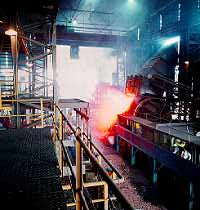Manufacturing

Zimbabwe possesses a well-integrated and diversified manufacturing sector. Within the country, the manufacturing sector possesses the strongest and most numerous internal linkages with the other productive sectors of the economy. The sector has the highest contribution (24 percent) to Gross Domestic Product (GDP), employs 17 percent of the formal labour force, and accounts for 41 percent of total exports.
Zimbabwe is currently implementing an economic reform programme, the success of which depends on the performance of the manufacturing sector. At the beginning, and in mid-1994, wide-ranging liberalisation measures were put in place by the authorities, entailing the introduction of Corporate Foreign Currency Accounts, (FCA's), in which 100 percent of export proceeds are retained by firms in a denominated foreign currency for their own use. Other liberalisation measures implemented were increases in dividend exchange rate and many exchange control liberalisation measures. In addition, the dividend remittability threshold for pre-1979 companies was raised from 25 percent to 50 percent of after-tax profits. Customs duties on most capital equipment have been abolished with effect from August 1 1994. The economy and, indeed, the manufacturing sector have already begun to respond positively to these measures.
The stock market was opened up to foreign investors to a limited extent in April 1994. Largely due to foreign investor interest in shares traded on the Zimbabwe Stock Exchange, the stock market indices reached unprecedented levels in early 1994. Although additional measures by way of further improving the overall investment climate still need to be taken, 1994 has already witnessed a number of rights issues and new stock market listings as the industrial sector restructures itself in preparation for future competition in a truly market-driven economy.
After the deep recession going back to the drought of 1992, the volume of production index for the manufacturing sector recorded an up turn from August 1993. During the first eight months of 1994, the sector grew by 11 percent, on a year on year basis. Overall positive real growth of 5 percent to 6 percent should be achieved in 1994.
Many investment opportunities present themselves for new and additional local foreign participants to take part in the exciting era that is now unfolding in Zimbabwe. Many trade and investment delegations continue to eye Zimbabwe for possible business deals. Government's commitment to the reform programme is unquestionable and further incentives to investors will soon be made available. The current high cost of finance is considered temporary and should come down as government rationalises its expenditure pattern in the medium term.
As peace returns to the Southern African region, and domestic economic recovery in Zimbabwe accelerates, the manufacturing sector is set to benefit from this peace dividend and, at home, to take its rightful place as the engine room of economic growth and development.
Early response signals to the economic reforms indicate that, since 1991, some subsectors of manufacturing have already started to increase the degree of export orientation. This is a result of increasing competitive pressures from competing imports, coupled with easier access to foreign exchange and foreign exchange-based export incentives.
 Increasing official attention is being focused on the development of small-scale industries, which offer real prospects for creating many jobs at low unit cost. Large firms are increasingly encouraged to form linkages with these firms through subcontracting arrangements as a way of rationalising their own operations to achieve competitiveness.
Increasing official attention is being focused on the development of small-scale industries, which offer real prospects for creating many jobs at low unit cost. Large firms are increasingly encouraged to form linkages with these firms through subcontracting arrangements as a way of rationalising their own operations to achieve competitiveness.
In early 1995, Export Processing Zones (EPZs) will be introduced in Zimbabwe. These zones, which will be both new geographic locations as well as designated existing firms, will have attractive tax incentives. The major ones are a five-year tax holiday, following which a corporate tax rate of 15 percent will be applicable, exemptions from customs duties, capital gains taxes and withholding taxes.
 One of the most far-reaching implications of the new policies is the transfer of the locating responsibilities for foreign currency to authorised dealers. The movement from an allocative system to a market-based one represents the removal of a huge premium that previously inhibited the conduct of business in Zimbabwe. The challenge now is that all our industries must respond positively to these changes, generate wealth for the country and create the much-needed jobs.
One of the most far-reaching implications of the new policies is the transfer of the locating responsibilities for foreign currency to authorised dealers. The movement from an allocative system to a market-based one represents the removal of a huge premium that previously inhibited the conduct of business in Zimbabwe. The challenge now is that all our industries must respond positively to these changes, generate wealth for the country and create the much-needed jobs.
 Increasing official attention is being focused on the development of small-scale industries, which offer real prospects for creating many jobs at low unit cost. Large firms are increasingly encouraged to form linkages with these firms through subcontracting arrangements as a way of rationalising their own operations to achieve competitiveness.
Increasing official attention is being focused on the development of small-scale industries, which offer real prospects for creating many jobs at low unit cost. Large firms are increasingly encouraged to form linkages with these firms through subcontracting arrangements as a way of rationalising their own operations to achieve competitiveness.
 One of the most far-reaching implications of the new policies is the transfer of the locating responsibilities for foreign currency to authorised dealers. The movement from an allocative system to a market-based one represents the removal of a huge premium that previously inhibited the conduct of business in Zimbabwe. The challenge now is that all our industries must respond positively to these changes, generate wealth for the country and create the much-needed jobs.
One of the most far-reaching implications of the new policies is the transfer of the locating responsibilities for foreign currency to authorised dealers. The movement from an allocative system to a market-based one represents the removal of a huge premium that previously inhibited the conduct of business in Zimbabwe. The challenge now is that all our industries must respond positively to these changes, generate wealth for the country and create the much-needed jobs.